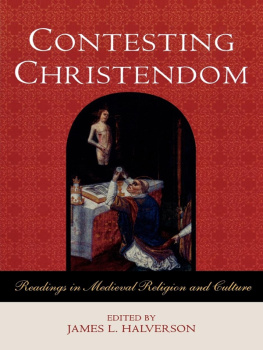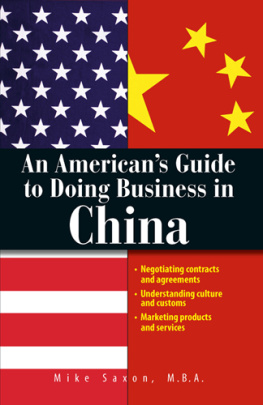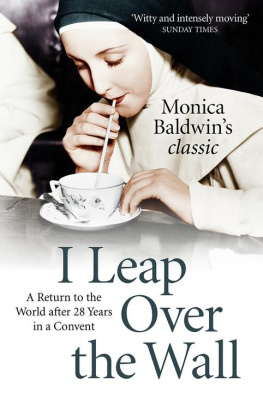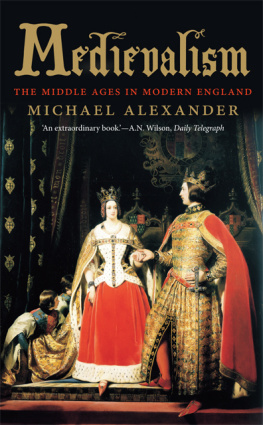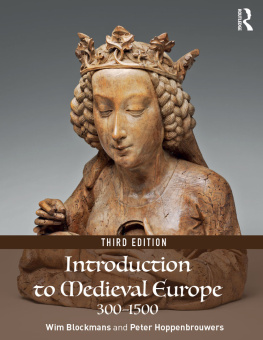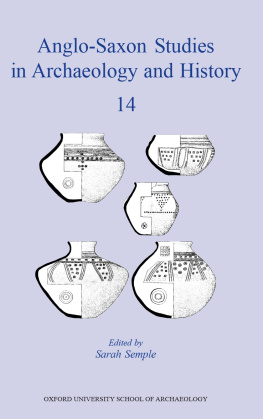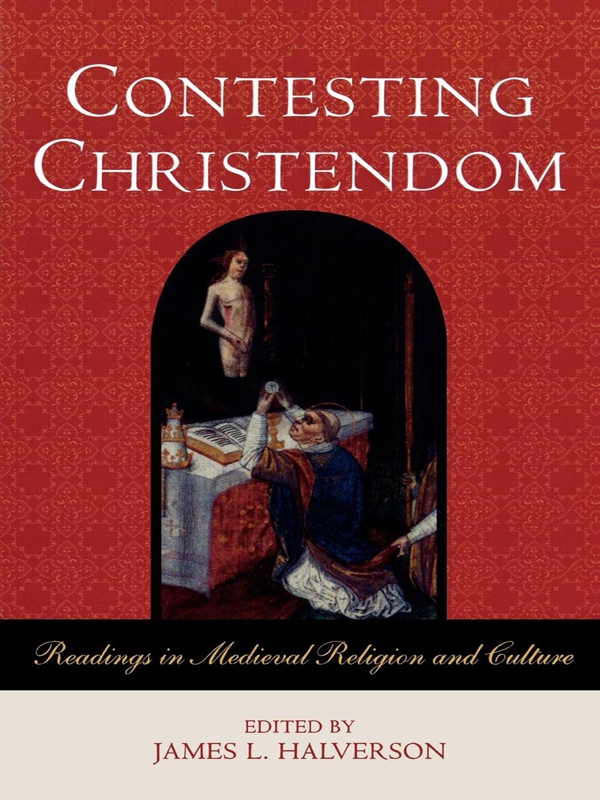James L . Halverson is professor of history at Judson University. He is the author of Peter Aureol on Predestination: A Challenge to Late Medieval Thought (1998) and coeditor of Sources of World Civilization with Oliver Johnson (2003).
About the Contributors
Rudolf Bell is professor of history at Rutgers University. His many publications include The Voices of Gemma Galgani: The Life and Afterlife of a Modern Saint with Cristina Mazzoni (2003), How to Do It: Guides to Good Living for Renaissance Italians (1999), Holy Anorexia (1985), and Saints and Society: The Two Worlds of Western Christendom, 1000 1700 (1982) with Donald Weinstein.
Constance Brittain Bouchard is Distinguished Professor of Medieval History at the University of Akron. A Fellow of the Medieval Academy of America, some of her most prominent books are Sword, Miter, and Cloister: Nobility and the Church in Burgundy, 980 1198 (1987), Strong of Body, Brave and Noble: Chivalry and Society in Medieval France (1998), and Those of My Blood: Constructing Noble Families in Medieval France (2001).
Peter Brown is Philip and Beulah Rollins Professor of History at Princeton University. He is the author of a dozen books including Augustine of Hippo (1967, 2000), The World of Late Antiquity (1971), The Cult of the Saints (1982), The Body and Society (1988), Power and Persuasion in Late Antiquity: Towards a Christian Empire (1992), Authority and the Sacred: Aspects of the Christianization of the Roman World (1995), The Rise of Western Christendom (1996, 2003), and Poverty and Leadership in the Later Roman Empire (2002). He has been the recipient of a MacArthur Fellowship (1982), a Guggenheim Fellowship (1989), and the Mellon Foundations Distinguished Achievement Award (2001).
Marcus Bull is senior lecturer in medieval history at the University of Bristol. He is the author of numerous books and articles including Knightly Piety and the Lay Response to the First Crusade: The Limousin and Gascony c. 970 c. 1130 (1993). He recently published Thinking Medieval: An Introduction to the Study of the Middle Ages (2005).
Caroline Walker Bynum is professor of Western European Middle Ages at the Institute for Advanced Study at Princeton University. A MacArthur Fellow from 19861991, she has served as president of both the American Historical Association and the Medieval Academy of America. Her book Holy Feast and Holy Fast received the Philip Schaff Prize of the American Society of Church History. Her book Fragmentation and Redemption received the Award for Excellence in the Study of Religion: Analytical-Descriptive Category from the American Academy of Religion. Her book The Resurrection of the Body received the Ralph Waldo Emerson Prize of Phi Beta Kappa and the Jacques Barzun Prize of the American Philosophical Society.
Mark R. Cohen is professor of Near Eastern studies at Princeton University. He won the National Jewish Book Award for Jewish Self - Government in Medieval Egypt (1980). Under Crescent and Cross: The Jews in the Middle Ages (1994) has been translated into Hebrew, Turkish, German, Arabic, and French. His most recent books are Poverty and Charity in the Jewish Community of Medieval Egypt (2005) and The Voice of the Poor in the Middle Ages: An Anthology of Documents from the Cairo Geniza (2005).
Georges Duby , late Chair of Medieval Societies at the College de France and a member of the Acadmie franaise, was one of the most prolific and influential medievalists of the twentieth century. Among his more prominent works are The Sunday of Bouvines (1973), translated in English as The Legend of Bouvines (1990), The Year 1000 (1974), The Age of the Cathedrals (1976), The Three Orders: Feudal Society Imagined (1978), The Knight, The Lady, and the Priest (1981), William Marshal: The Flower of Chivalry (1984), and Lhistoire continue (1991).
Eamon Duffy is professor of the history of Christianity, and Fellow and Director of Studies at Magdalene College, Cambridge. A leading voice on late medieval and Reformation England, his most important contributions include The Stripping of the Altars: Traditional Religion in England, c. 1400 to c. 1580 (1994), Saints & Sinners: A History of the Popes (1997), The Voices of Morebath: Reformation and Rebellion in an English Village (2001), Marking the Hours: English People and Their Prayers, 1240 1570 (2006).
Joan M . Ferrante is professor of English at Columbia University. A past president of the Medieval Academy of America, she has published many articles and several books, including To the Glory of Her Sex: Womens Roles in the Composition of Medieval Texts (1997), The Political Vision of the Divine Comedy (1984), and The Lais of Marie de France, a translation and commentary written with Robert Hanning (1978).
Richard Fletcher , late professor of history at the University of York, won the Los Angeles Times History Book Award and the Wolfson Literary Award for History for The Quest for El Cid (1989). He has authored a number of other books, including The Cross and the Crescent (2004), Bloodfeud (2002), The Conversion of Europe: From Paganism to Christianity, 1386 AD (1999), and Moorish Spain (1992).
Katherine L. French is associate professor of history at SUNY New Paltz. In addition to numerous articles, she is the author of People of the Parish: Community Life in a Late Medieval English Diocese (2001).
Thomas A. Fudge serves as Director of the Hewitt Research Foundation. He is the author of two books about the Hussite movement: The Magnificent Ride: The First Reformation in Hussite Bohemia (1998) and The Crusade against Heretics in Bohemia (2 002).
Herbert Grundmann served as president of the Monumenta Germaniae Historica from 1959 until his death in 1970. His most important work, Religise Bewegungen des Mittelalters (1933), set the agenda for all subsequent scholarship on medieval religious culture. His other important works include Ketzergeschichte des Mittelalters (1963) and im Mittelalter (1965). His many articles are collected in the three volume Awgewhlte Afstze (19761978).
Karen Louise Jolly is associate professor of history at the University of Hawaii at Manoa. She is the author and editor of numerous studies on early medieval religion, including Tradition and Diversity: European Christianity in a World Context to 1500: Edited Primary Sources (1997) and Popular Religion in Late Saxon England: Elf Charms in Context (1996).
Lester K. Little is Dwight W. Morrow Professor Emeritus and a Senior Fellow of the Kahn Liberal Arts Institute at Smith College. His principal publications include Religious Poverty and the Profit Economy in Medieval Europe (1978), Liberty, Charity, Fraternity: Lay Religious Confraternities at Bergamo in the Age of the Commune (1988), Benedictine Maledictions: Liturgical Cursing in Romanesque France (1993), and with Barbara H. Rosenwein, Debating the Middle Ages: Issues and Readings (1998).
Rob Meens is professor of history at the Universiteit Utrecht. He has written dozens of articles on early medieval religious culture and the history of penance and is coeditor of The Bobbio Missal: Liturgy and Religious Culture in Merovingian Gaul (2004).
Bernd Moeller is Professor Emeritus of Church History at the Georg-August-Universitt, Gttingen. Best known in the English-speaking world for his seminal book Imperial Cities and the Reformation (1972), he is a leading scholar of late medieval and Reformation Germany.
Andrew P. Roach is currently lecturer in history at the University of Glasgow. A former economic forecaster, he has contributed significantly in several fields, including late medieval French religious culture, the application of network theories to religious movements, and the teaching of history to undergraduates.

